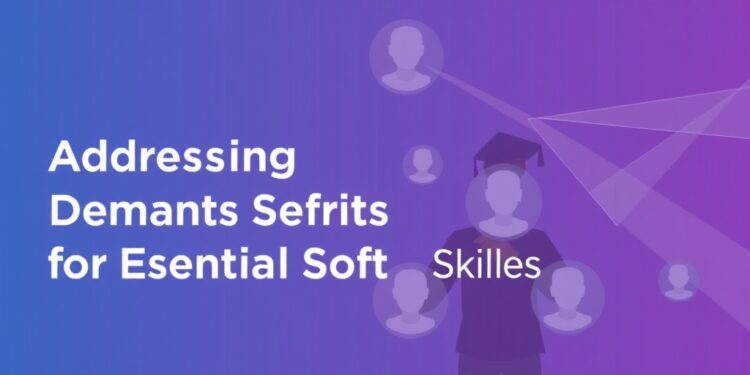The modern workforce is evolving. In an era marked by rapid technological advancements and shifting labor market demands, the emphasis on soft skills is climbing to unprecedented heights. Professionals today are no longer judged solely on their technical abilities or qualifications; rather, employers are placing considerable value on personal attributes such as effective communication, critical thinking, and time management. These so-called soft skills, often intertwined with behavioral patterns and social skills, play a significant role in fostering teamwork and independent work efficiency. Iñaki Bustinduy, a course instructor from the Universitat Oberta de Catalunya (UOC), underscores the importance of soft skills in today’s job landscape, particularly in managerial positions.
Recent research from UOC has broken new ground in investigating how online microcredentials can bridge the skills gap in these essential areas. Led by Carles Bruguera and powered by the insights of the Labour Market Research and Analysis Unit (UPAL), this groundbreaking study correlates flexible, online learning options with the growing necessity for soft skills in the workplace. The findings explore not just the acceptance of soft skills training, but also outline how these credentials can shift attitudes and foster a continual learning environment—all without disrupting professional life.
Microcredentials represent a significant shift in how knowledge is disseminated and validated in the digital age. These academically recognized certificates assert that individuals have acquired specific knowledge or competencies over short course durations, offering professionals the flexibility to upskill without the burden of lengthy formal educational commitments. In the context of today’s volatile job market, such credentials are increasingly appealing. They permit employees to enhance their skills on their own time, and their online nature provides access to premier international programs, thus broadening the range of learning opportunities available. The study reveals an intriguing perspective: microcredentials, though primarily embraced in the realms of digital and technological expertise until now, hold the potential to significantly bolster the development of soft skills—an area identified as critically underserved in many sectors.
But the study also emphasizes the limitations of current offerings. Bruguera notes that there has been a lack of rigorous exploration of microcredentials in soft skills, specifically from the viewpoint of business stakeholders who are most familiar with the evolving requirements of their industries. The qualitative research gathered information from 85 key figures in the labor market, including executives and human resources professionals, revealing a generally positive sentiment towards online microcredentials. However, it also highlights a set of obstacles that must be navigated for these educational innovations to reach their fullest potential.
One of the primary challenges identified is assessing skills such as leadership and teamwork in online settings, which often leads to ambiguity in measurement. There’s also a prevailing skepticism regarding the credibility of microcredentials, as certain organizations continue to view them as inferior to conventional training approaches. Additionally, the research points to a pressing need for high-quality, practical experiences that genuinely prepare individuals for real-world applications. Carme Pagès, an influential figure in the study and an associate professor at the UOC, emphasizes the necessity for robust assessment systems that validate the skills learned through microcredentials.
Existing educational strategies—reskilling and upskilling—further complicate the landscape. Reskilling involves the transformation of one’s skill set to adapt to new roles, while upskilling aims to enhance capabilities within existing domains. Bustinduy elucidates that reskilling could encompass areas such as emotional intelligence or creativity, while upskilling could deepen competencies in digital leadership or effective communication in hybrid environments. The overarching goal is to enhance adaptability in a world that is increasingly defined by technological innovations and ever-evolving market demands.
To address these challenges head-on, the study offers a compelling set of recommendations aimed at reshaping the design of microcredentials. A more practical orientation, for instance, is vital. Using engaging methodologies such as role-playing, case studies, and collaborative projects—instead of theoretical assessments—can lead to a richer, more applicable learning experience. Furthermore, the incorporation of immersive technologies like virtual reality can transform the learning environment, providing students with lifelike opportunities to practice and refine their soft skills.
An active partnership with industry stakeholders serves as another essential pillar for enhancing the effectiveness of microcredentials. By integrating insights and expertise from businesses into their development, educational institutions can create programs that are not only relevant but also market-driven. Such collaboration ensures that the skills taught match the talents employers are actively seeking. Coupled with these strategies, an evidence-based assessment framework can provide clear, demonstrable validation of the competencies acquired through these online offerings, enhancing their acceptability among prospective employers.
To further push the agenda of soft skills development in the professional realm, UOC is organizing a seminar on this very topic, scheduled for 27 March. This event promises to bring together leading experts in the field who will discuss the significance of soft skills as a foundation for enhanced employability. The seminar aims to build on the research findings and facilitate a platform for dialogue among attendees on strategies for addressing the ongoing skills gap in today’s workforce.
In summary, the study published in the journal Distance Education signifies an important intersection between online learning and the development of soft skills, advocating for educational models that keep pace with the requirements of modern employment. As companies increasingly recognize the tremendous value of interpersonal skills, the emphasis on comprehensive training that equips professionals to face contemporary workplace challenges becomes ever more critical. Adapting education to align with these needs marks a pivotal step towards nurturing a workforce that is not only skilled but also proficient in navigating the complexities of their professional environments.
Subject of Research: The role of microcredentials in soft skills development
Article Title: Microcredentials: Unlocking Soft Skills for the 21st Century Workforce
News Publication Date: October 2023
Web References: UOC, Distance Education Journal
References: DOI link – 10.1080/01587919.2024.2435645
Image Credits: Not provided
Keywords: Soft skills, microcredentials, online learning, employability, workforce development, education, training, reskilling, upskilling.




